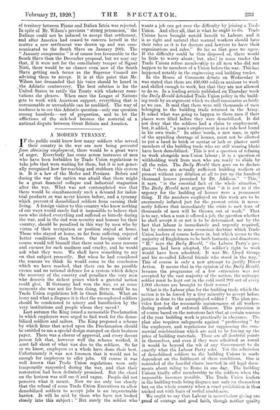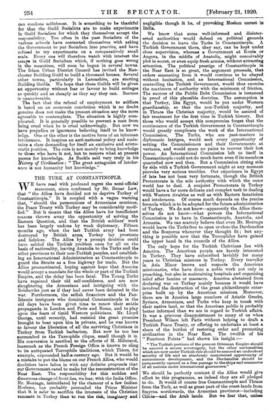A MODERN TYRANNY.
IF the public could know how many soldiers who served their country in the war are now being prevented from obtaining employment, there would be a great wave of anger. Everybody has come across instances of men who have been forbidden by Trade Union regulations to take jobs that were waiting for them, but it is not gener- ally recognized how far-reaching and stubborn this system is. It is a law of the Medes and Persians. Before and during the war the nation was afraid that there might be a great financial collapse and industrial stagnation after the war. What was not contemplated was that there would be simultaneously such a demand for indus- trial products as was never known before, and a tyranny which prevented demobilized soldiers from earning their living. A foreign visitor to this country who knew nothing of our ways would surely find it impossible to believe that men who risked everything and suffered so bitterly during the war, and in the end won security and honour for their country, should be penalized in this way by men who by virtue of their occupation or position stayed at home. Those who stayed at home, so far from suffering, enjoyed better conditions than before. Our foreign visitor of course would tell himself that there must be some reasons and excuses for such madness and cruelty, and he would ask what they were. We shall have something to say on that subject presently. But when he had considered the reasons we think he would come to the conclusion which we have reached, that there can be no possible excuse and no rational defence for a system which delays the recovery of the country and penalizes the very men who deserve the richest prizes which a grateful nation could give. If Germany had won the war, as at some moments she was not far from doing, there would be no Trade Union regulations left in Great Britain. What an irony and what a disgrace it is that the unemployed soldiers should be condemned to misery and humiliation by the very institutions and people whom they saved Last autumn the King issued a memorable Proclamation in which employers were urged to find work for the demo- bilized soldiers and sailors. The King proposed a scheme by which firms that acted upon the Proclamation should be entitled to use a special design stamped on their business paper. There was a chorus of approval, and every decent person felt that, however well the scheme worked, it must fall short of what was due to the soldiers. So far as we know, employers as a whole have done their best. Unfortunately it was not foreseen that it would not be enough for employers to offer jobs. Of course it was well known that Trade Union regulations were only temporarily suspended during the war, and that their restoration had been definitely promised. But the cloud on the horizon was still sud' and vague. People did not perceive what it meant. Now we see only too clearly that the refusal of some Trade Union Executives to allow demobilized soldiers to accept jobs is an impenetrable barrier. It will be said by those who have not looked closely into this subject : " But surely the soldier who wants a job can get over the difficulty by joining a Trad3 Union. And after all, that is what he ought to do. Trade Unions have brought untold benefit to Labour, and it is as right and natural that manual workers should have their rules as it is for doctors and lawyers to have their organizations and rules." So far as that goes we agree. If the difficulty could be thus disposed of, there would be little to worry about ; but, alas ! in some trades the Trade Unions refuse membership to all men who did not happen to be members of a Union before the war. This has happened notably in the engineering and building trades. In the House of Commons debate on Wednesday it was stated that there are 400,000 soldiers anxious to work and skilled enough to work, but that they are not allowed to do so. In a leading article published on Thursday week the Daily Herald defended Trade Union policy in the build- ing trade by an argument which we shall summarize as fairly as we can. It said that there were still thousands of men belonging to the building trade retained in the Army. It asked what was going to happen to these men if their places were filled before they were demobilized. It did not deny that the soldiers had a claim to employment, but, it added, " a man's employment is as a rule best found in his own trade." In other words, a new man, in spite of the appalling shortage of houses, must not be allowed to put a hand to brick or mortar or lath or plaster until members of the building trade who arc still wearing khaki have been demobilized. This is not a question of refusing to work alongside non-Union labour ; it is a question of withholding work from men who are ready to abide by all the rules. The Daily Herald then goes on to declare that " there are actually sufficient building workers at present without any dilution at all to put up the hundred thousand houses promised by Dr. Addison." This," it says, " is the essential fact of the whole situation." The Daily Herald next argues that it is not as if the urgency for the building of houses were a permanent thing. If the numbers employed on this work are to be enormously inflated just for the present crisis, it neces- sarily follows that immediately the crisis is met tens of thousands of men will be thrown out of work." That is to say, when a man is offered a job, the question whether he shall accept it or not is to be determined, not by the fact that labour is immediately and urgently required; but by reference to some economic doctrine which Trade Union leaders of course believe in, but which seems to the majority of Englishmen to be both fantastic and disastrous. " If," says the Daily Herald, " the Labour Party's pro- gramme had been adopted, the soldier's right to work would have been admitted. It was Mr. Lloyd George and his so-called Liberal friends who stood in the way." This of course is only a new attempt to justify Direct Action. It means that in the opinion of the Daily Herald, because the programme of a few extremists was not accepted by the vast majority of the nation, the unhappy soldier must be kept out in the cold until 999 out of every 1,000 electors are brought to their senses What is the Labour plan for the building trade which the nation is to be forced by a tiny minority to accept before justice is done to the unemployed soldier ? The plan pro- vides first for the reasonable maintenance of all workers during periods of enforced idleness. This provision is of course based on the notorious fact that at certain seasons of the year building work is practically in abeyance. The plan also requires safeguards against " profiteering " by the employers, and regulations for suppressing the com- mercial combinations which are said to be forcing up the price of building materials. These are all doubtful points in themselves, and even if they were admitted as sound it would be beyond the wit of any Government to do exactly what the Labour Party asks. Yet the admission of demobilized soldiers to the building Unions is made dependent on the fulfilment of these conditions. One is reminded of the fanciful clause inserted in old legal docu- ments about riding to Rome in one day. The building Unions kindly offer membership to the soldiers when the impossible becomes possible. The Trade Union leaders in the building trade bring disgrace not only on themselves but on the whole country when a cruel prohibition is thus tricked out with feats of verbal nimbleness.
We ought to say that Labour is nevertheless giving one proof of courage and good faith, though neither quality can condone selfishness. It is something to be thankful for that the Guild Socialists are to make experiment/2i in Guild Socialism for which they themselves accept the responsibility. Too often in the past Socialists of the venous schools have contented themselves with asking the Government to put Socialism into practice, and have refused to try experiments on a comparatively small scale- Every one will therefore watch with interest the essays in Guild Socialism which, if nothing goes wrong in the meantime, will soon be begun in several towns. The Irlam Urban District Council has invited the Man- chester Building Guild to build a thousand houses. Several other towns, particularly in Lancashire, are starting Building Guilds. We hope that these Guilds will be given an opportunity without fear or favour to build cottages as quickly and as cheaply as they say they can. Success is unanswerable.
The fact that the refusal of employment to soldiers is based on an economic conviction which is no doubt genuine does not make the present situation any the more agreeable to contemplate. The situation is highly com- plicated. It is generally possible to prevent a man from being cruel when he is cruel unknowingly. But now we have prejudice or ignorance believing itself to be know- ledge. One or the other is the motive force of an inhuman intolerance. It inspires an anti-national policy and main- tains a class demanding for itself an exclusive and aristo- cratic position. The cure is not merely to bring knowledge to those who have it not, but to remove what at present passes for knowledge. As Buokle said very truly in his History of Civilizatten " The great antagonist of intoler- ance is not humanity but knowledge."



































 Previous page
Previous page